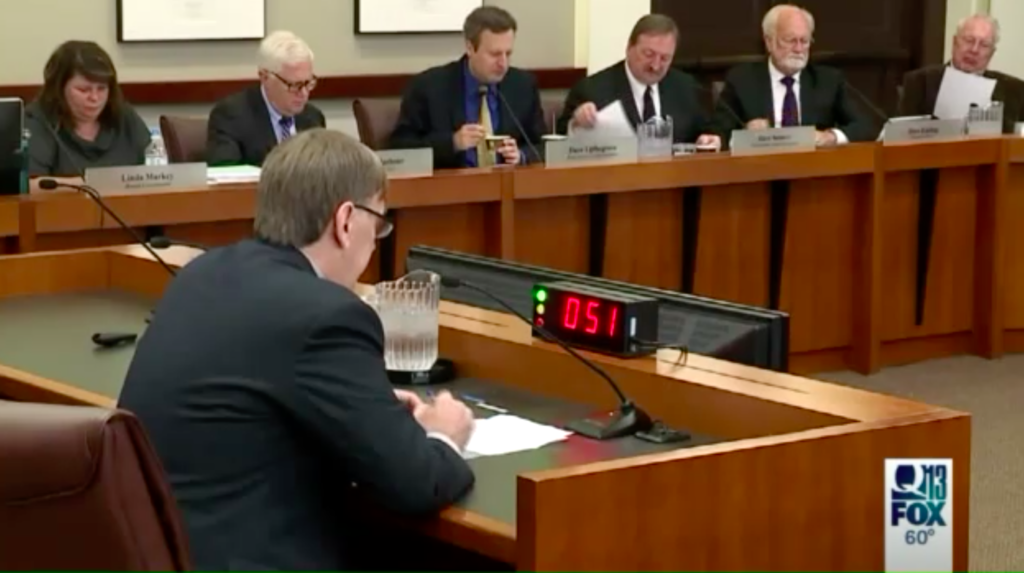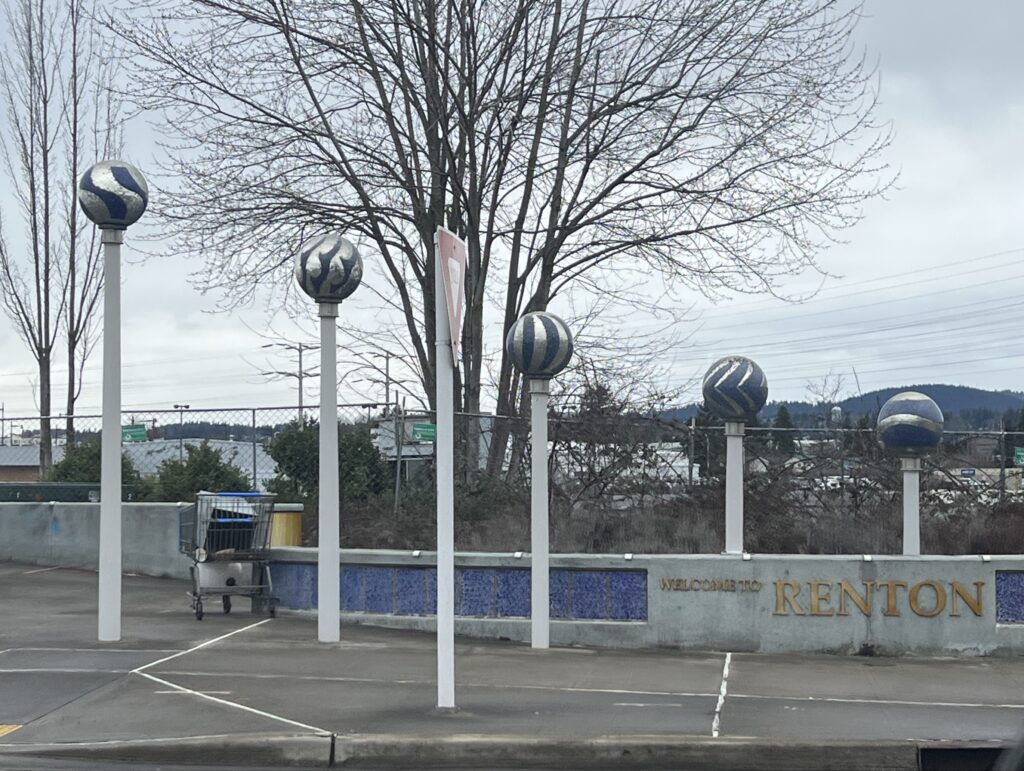
Renton Council President Randy Corman makes a case to Sound Transit Board to increase Renton’s share of service in ST3. Photo Q13 Fox
As Sound Transit 3 was being formed, it became ever more apparent that the structure of Sound Transit was repeatedly leaving Renton out of a fair share of service.
Sound Transit is its own taxing district with its own governance board. It was structured by the legislature to have four “sub-areas” that are each supposed to receive as much benefit as they pay in. The legislature placed Renton in the Eastside sub-area, along with Bellevue, Redmond, Issaquah and other eastside cities. Under the legislative structure, certain current city elected officials were appointed by the County Executive to represent these subareas. This structure unfortunately has a built-in conflict for those appointed; do they represent the sub-area overall, or give preference to the city that elected them? The County Executive picked elected officials from Redmond, Issaquah, and Bellevue to represent our eastside subarea. These three cities will receive Sound Transit light rail service in the coming years. Renton has been left out of rail service, and will only receive two Bus Rapid Transit (BRT) stations.
In previous blog entries I covered how Sound Transit 1 (Sound Move) disappointed Renton in 1997 by leaving us out of the Sounder and Link light rail systems, instead offering $90-$100 million for improved Bus/HOV access from I-405 to Boeing, Paccar, and the Landing area that has never materialized. Sound Transit 2 was supposed to improve Renton’s service, but did not give Renton any new capital funding, and again left Renton with no rail service. So when Sound Transit 3 was being finalized at approximately double the costs of one and two put together, with still no rail connection for Renton and only one bus rapid transit stop in our city, many of us in Renton leadership pushed for a fair share with all the force we could muster. Mayor Law, Council Members Ruth Perez, Don Persson, and I were covered by news outlets as we lobbied through every means possible, putting Sound Transit on notice that we needed more service, and would even work to defeat Sound Transit 3 if the agency again denied Renton residents meaningful service for its budget-busting price tag. (Note that Sound Transit issues pass by such a large margin that even if all voters in Renton vote no, they still pass)
Channel 13 news covered some of my activities here. Ruth Perez made a very strong case for Renton in numerous forums, including this NPR article, emphasizing the lack of regional equity and Renton not having a seat at the table. Don Persson was covered by multiple sources, and you can read his views here.
Mayor Law, Renton’s official spokesperson, led Renton’s negotiations. He organized a Renton push for a second BRT stop in Renton, along with advanced purchase of the Ford dealership property at Main and Grady which would hold a new transit center and host a 2000 car parking structure. Also, a second BRT station would be added at exit 7, along with a 200 car parking lot. In addition, $5 million would be spent studying future light rail service, so that if a Sound Transit 4 comes along Renton would be included. Lastly, Mayor Law made it clear it was past time to get a Renton official on the Sound Transit Board, and the King County executive appeared open to it. Most or all of Renton’s officials did not feel like this deal offered us a fair share, but it was the best we could hope for given the obstacles, and would at least put us in a position to get more equitable treatment in the future. Some of Mayor Law’s correspondence is his 1/20/16 letter here and his 4/28/16 letter here.
His commitments from Sound Transit and the King County Executive gave Mayor Law the confidence to release this newsletter announcing the new transit center on September 30, 2016.
At one point as the election drew near he found that Sound Transit had spent our approximate $68 million remaining from Sound Move on something else, and he prepared a letter to the board summarizing Renton’s long-standing frustrations. He informally shared the letter with Sound Transit Board members, demanding that they keep their promises to Renton.
His complete draft letter is here and summarizes Renton’s frustrations well. A few excerpts are:
Dear Sound Board Members,
We are struggling with how to address our extreme disappointment over the last-minute word from Sound Transit staff that $68 million committed to Renton 20 years ago from Sound Move, which we planned to use in the relocation of Renton’s downtown transit center and a parking garage, was reallocated to another eastside project. This revelation came after months of discussions and negotiations to the contrary, and leaves us again wondering why Renton has never received any Sound Transit infrastructure investment to offset the hundreds of millions of local tax dollars paid to the transit agency over all these years….
To be informed in the eleventh hour by Sound Transit staff that no financial support for this project was available unless Sound Transit Phase 3 (ST3) is passed by voters this fall was not only an unreasonable condition, but totally unfair to the citizens of Renton and residents in the surrounding area of unincorporated King County…..
… I can’t, however, ignore what we believe is a grossly unfair situation that could have been addressed or spoken to when I first proposed this project last fall. Our City Council and members of our community expect some answers…
Sound Transit promised Mayor Law they would prioritize Renton’s projects if ST3 won approval, and even showed willingness to finally add a Renton official to the Sound Transit Board (after 26 years without one.) After ST3 passed, the County executive did add a Renton Council Member to the Sound Transit Board. Renton Council Member Ed Prince joined the board about four years ago.
This made it even more surprising to learn that Sound Transit has “Realigned” it’s ST3 projects, delaying Renton’s Bus Rapid Transit system by two years and delaying parking at our two stops until 2034. This includes the Parking at Main and Grady that was supposed to be paid for with our original Sound Move funding. For eight years Renton will have two BRT stops with no parking and no other Sound Transit improvements.
Even though Renton has a seat on the Sound Transit Board, many Renton elected officials and staff that I interviewed did not become aware of these delays until months after they were put in motion and Renton’s money was again reprogrammed to finish projects in other cities.
While Sound Transit is referring to the loss of parking at these stations as a simple delay, Renton has been down this path too many times for us to easily fall for it again. Based on our history with the organization, many of us are concerned that voters will have to approve the money again in a future ST4 if we are ever going to see it.
Furthermore, even if it does happen as part of ST3, the fact that we purchased the Renton Sound Ford building and tore it down 6 years before BRT is to begin, and 14 years before parking will be placed on the site, means Renton will have a fenced construction site at our Southern gateway for 14 years. This, combined with the county actions that have left our former Red Lion Hotel and Convention Center in ruins across the street from the site, is a heavy blow to the vitality of our Renton Village shopping center and indeed all of Renton.
Renton’s board representation has not made a noticeable difference in a bad pattern, and has even given Renton false confidence that we would see better treatment. Renton needs to push as a city for restoration of our parking facilities at our BRT stations, and also for Sound Transit to quickly provide us with another promised deliverable from ST3– a $5 million dollar study for concept for a future Renton Link light-rail connection if there is an ST4. With the way Sound Transit has treated Renton until now, it looks like we would be lucky to get our BRT parking back in ST4, while we help subsidize rail to every other major city in the region.

Sound Transit delays may leave the former Sound Ford site, behind our Rainier Ave. gateway sign, looking fenced and derelict for up to 14 years as Renton awaits a promised parking garage for Bus Rapid Transit.


Thanks for the informative article. What are the mechanisms of accountability here? How do elections influence the outcome of Sound Transit decisions?
My opinion: We have two lines of influence.
One on the state level where out representatives and senators can look out for us. On the local level where we need council representatives who will fight for us.
Let’s all pay attention to the next voting cycle. There’s some people who haven’t looked out for our interests and have put other interests first.
Dear Councilmember Ed Prince,
It is unacceptable to claim that you are looking out for people of color while simultaneously denying them the transit that they have paid for. Your actions not only perpetuate systemic racism and inequality but also blatantly disregard the needs of a marginalized community. It is time to address this issue and ensure that all members of our community have access to safe and reliable transportation.
Dear Councilmember Carmen Rivera,
Your policies, which have statistically resulted in the deaths of over twenty LGBTQUIA+ individuals in increased traffic accidents over the past two years, contradict your claim of supporting this community. As a public figure, it is your responsibility to enact policies that promote the safety and well-being of all residents, regardless of their sexual orientation or gender identity. It is unacceptable for the very policies that you advocate for to disproportionately harm the very community you claim to champion
Dear Councilmember Ryan McIrvin,
Your policies have brought hundreds of Seattle homeless individuals into Renton, thereby exacerbating the issue of homelessness and creating competition for resources that should go to Renton’s homeless population. As a councilmember, it is your duty to serve the needs of Renton’s residents, including those who are experiencing homelessness. Your actions not only disregard the needs of our community but also perpetuate the cycle of homelessness and displacement.
Truth
It is crucial to avoid perpetuating misunderstandings by considering the whole picture.
In the case of Councilmember Ed Prince, it would be unfair to suggest a denial of transit access to Renton people of color without evidence, as there are other factors at play such as inadequate taxation.
Similarly, with Councilmember Carmen Rivera, police pursuit policy is complex and multifaceted, making it unlikely that one policy is solely responsible for the “increased deaths.”
As for Councilmember Ryan McIrvin, it is important to recognize that homelessness is a regional issue that requires collaboration between King County, Seattle, and Renton. Accusing him of intentionally exacerbating the issue is unfair.
It is crucial to approach issues related to equity, safety, and homelessness with a nuanced understanding of the complexities involved. I would advice you to educate yourself first before continuing.
Renton is no place for hate.
Ok buddy.